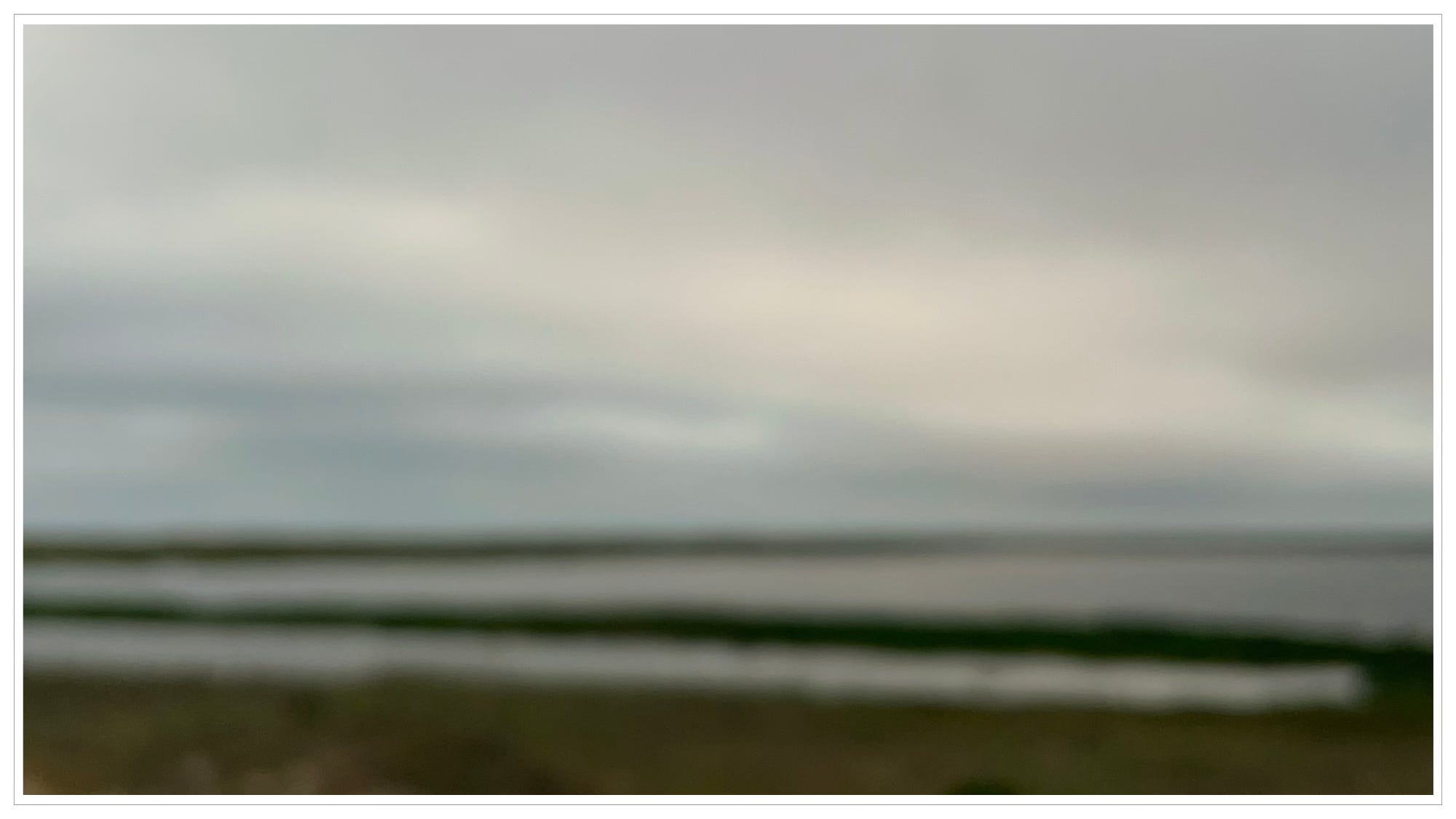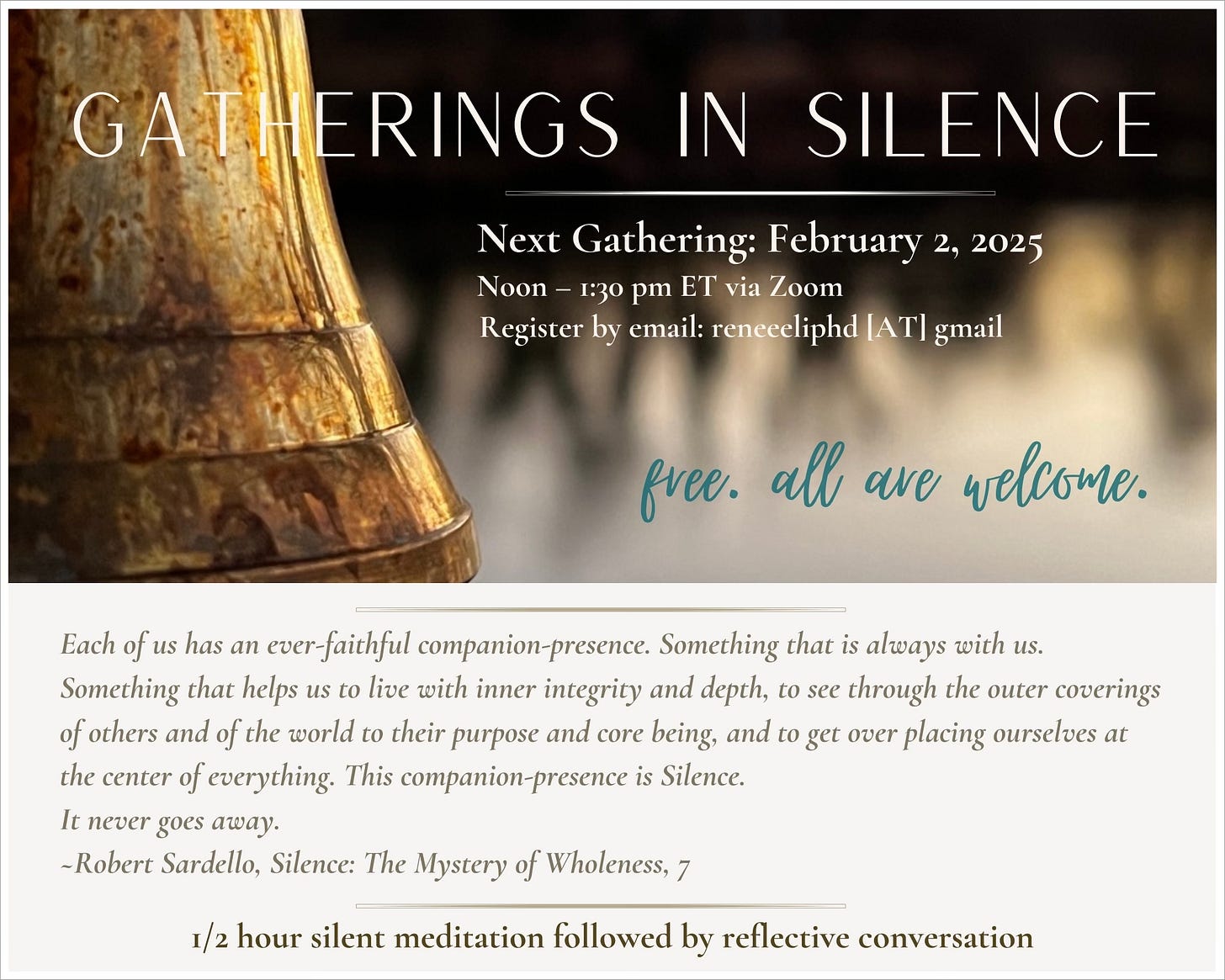Dear Friends,
Today’s essay comes in response to a general feeling in the air. It comes after days of reflecting on Bishop Mariann Edgar Budde’s plea, as much from her steadfastness since. Sweetly, it comes after watching this video of a penguin’s heartwarming farewell to a caregiver, pausing between experience and essence, both being so palpably good and true. And it comes as a breath of hope, which may seem strange, given the word “suffering” in the subtitle.
Last week’s collage poem, “Standing by the Water Thanking It,” and the brief essay before it, “Do Not Look Away,” set the stage to explore suffering and the sacred heart. Today’s essay is the first in this new series.
During our monthly Zoom Gathering in Silence next Sunday, we will reflect on suffering and the path of the heart. Please accept my personal invitation to join in pause and heartful conversation. Details below.
With love,
Renée
We Live in an Unfinished World
You wake from a dream, the dream is a map, and the map is your heart. Standing in the dark, you can’t see its cordate turns. What you see is the earthworm you passed at first on the sidewalk yesterday, its body barely moving in the mid-day sun, having come up for air after the deluge on Wednesday. You backed up, as if a body on replay. Crouching down, you slipped your fingers inside the heat beneath its belly and the baking concrete, lifting as gently as can be the possibility that this little creature might make it if you give back to the spring-dream grass and earth its desire to be. You will never know. But something inside lets out a sigh and you keep going.
Just this side of the old Five & Dime, a man half your age crouched on the curb with a sign in his hands steps up and begins to pray. He’s praying for you. You look at him, perplexed. His eyes, cobalt with kindness, nod toward the brace on your knee, the brace that has become by now a second skin, three years out since your wife whipped the floor with the first grand mal, you there to keep her body from being battered six long months before the cancer won. You have nothing with which to thank him for nursing your healing but two words that won’t bring him warmth when night comes. He says yesterday he walked a continent. He laughs. It’s a sheepish laugh eternally sincere. You want to join him. You muster a smile. Then something inside lets out a sigh, and when he crouches again to face the cars, you keep going.
We live in an always unfinished world. We live in a world endlessly unfolding, a world groping through the dark not-knowing toward what it is always yet to become. We are bodies after all. To be a body is to be an ongoing process of becoming, unto and through the final breath.
Like a tree, the whole of life forever reaches through the inside perils of its ongoing endeavor to be, risking the outside hazards of rough weather: the broken branches and bruised blossoms, the shriveled, the sickly, the faded flowers—all in their rightful place, all of them mirrors of what the trunk that bears them has undergone to grow.1 The very fact of living brings with it the very fact of suffering. For to suffer is to undergo, to bear, as with child. Life carries suffering inside it. We might bear it more bravely if we let go of the idea of the Fall, namely, that pain is punishment, all the while bearing in our hearts the tender effort to lift suffering where we, of our loving gestures, can. This is the paradox of human being, but it is not punitive.
In an evolutionary world, it is not that an almighty god sends suffering. It is that suffering is inevitable in the process of becoming—life feeling its way through the bumps and bumbles of being alongside a world of beings, trying this and trying that until a next expression emerges and takes hold as a new mode. In an evolutionary world, suffering is unavoidable.2 It precedes the human and continues all around us. In an evolutionary world, God is an evolutionary process. We are cells emanating from and reflecting on this process. All life is divine expression always unfolding in, as, and through an always unfolding universe. And so, suffering is not ours alone. The human experiences unique ways of suffering. We have a particular responsibility to it.
Infinitely complex expressions of life that we are, we bear suffering not only in birthing, not only in growing, not only in illness, injury, and decline of the physical body. We bear suffering in the agonies, the sorrows, and “unconsummated longings” of a feeling heart.3 A human heart of conscience bears with care the suffering of others.4 But the wily machinations of ego consciousness turn suffering into struggle and bring avoidable pain to bear in our daily lives and upon others. These machinations are writ large in every subtle and not-so-subtle act of greed, false pride, envy, resentment, grabs for power and control, deception of self and other, and conscious and unconscious wriggles for positive regard. All of these are resistance to the naked truth of suffering. Not one of us is immune to them, however varying the shades.
I wish to propose something, something the mystics have long known, something to touch the inner within of you and me and, one by one, each ache that befalls us. It won’t fix what hurts. It won’t bring certainty. It won’t change the news today. But what follows of what the mystics have long known may breathe a “ventilating force of extravagant tenderness” into the crescendo of unbearable suffering of our lives and the living world.5 Where there is tenderness, we can be sure, there is love. And where there is love, there is the evolutionary transmutation of being.
The mystics have long urged that bearing suffering with intention releases vital energy for the becoming of all life, which, of course, includes our own.6 But it was Teilhard de Chardin, a paleontologist who was no less a mystic, writing some of the most groundbreaking work on evolution in the twentieth century—work written as a man of the cloth, a Jesuit priest, work forbidden by the Catholic church to be published until after Teilhard died, and so, work that stirred in Teilhard unconsummated longings to share—it was this work that brought science to bear on the reflections from wisdom traditions about suffering with intention.
Teilhard recognized the activities of life are work. This, you may say, is not news. But stay with me, and let’s follow his thread.
Work is the force of energy given to and released from any entity of being as the activities of being.
Work is the force of becoming. Energy is its spiritual sustenance. Form is the manifestation of the transmutation of energy.
Here’s the flesh and blood of what those quantum abstractions mean:
It takes energy to imbibe the world in a breath and turn that breath into blood. It takes energy to transform a leaf, a berry, the inner heart of a walnut into a cellular membrane, grey matter, the marrow inside stone-hard bone. It takes energy to carry a child until he can carry his weight on his own. And it takes more energy still to bear the pain of watching him fall, the long nights absent a beloved, a body made vulnerable by growing old. Suffering requires more energy in the work of life. Because life is an open system, suffering also releases more energy in this work and feeds more to the evolutionary process.7
Suffering with intention is not suffering stepped over, distracted from, pushed through, resented, and resisted. Suffering with intention is suffering allowed inner feeling by an open heart. Suffering with intention sighs upon the world a force of extravagant tenderness and hands us over to laboring with conscience on behalf of the becoming of all that is.
Suffering with intention helps usher humanity along.
I do not believe we come by this way of being without the inner strenuousness of active surrender, without learning to let life undo us a little bit, if not a lot. And here’s why: suffering with intention is borne through the actual physical heart, an exquisitely perceptive (physical) manifestation of inner and outer feeling that has become in the modern world flaccid to the capacity to bear the feeling it cannot help but feel! On another day, I’ll tell you about this capacity and modern diseases of the heart. But today, I wish to leave you with this:8
Go gently, dear friend. In these dark days, go gently, bearing with tenderness your own travails of being. Then, and only then, can you and I begin to come alive with extravagant tenderness on behalf of care for and the becoming of us all and this living earth – our breath, our body, our place of belonging.
Your touch of ❤️ helps these essays reach more people and lets me know who’s here.
Forthcoming
February Gathering in Silence followed by Reflective Conversation
What began as an experiment last year—to explore what it would be to come together in the virtual space in Silence—has become a monthly refuge and sanctuary of connection, followed by conversation in wonderment.
All are welcome.
Learn more about Beyond the Comfort Zone.
Pierre Teilhard de Chardin, “The Meaning and Constructive Value of Suffering,” trans. Noël Lindsay in ed. Neville Braybrooke, Teilhard de Chardin: Pilgrim of the Future (New York: Seabury Press, 1964), pp. 23–28.
Ibid. See also Louis M. Savary, “Suffering and Love in Teilhard’s Spirituality,” Center for Christogenesis, May 30, 2017, https://christogenesis.org/suffering-and-love-teilhard/
James Finley, Meister Eckhart’s Living Wisdom: Indestructible Joy and the Path of Letting Go (Louisville, CO: Sounds True, 2014).
P. D. Ouspensky offers the most eloquent and concise definition I’ve encountered for conscience as “inner feeling.” See P. D. Ouspensky, In Search of the Miraculous: Fragments of an Unknown Teaching (London: Routledge & Kegan Paul, 1950).
Gregory Boyle, The Whole Language: The Power of Extravagant Tenderness (New York: Simon & Schuster, 2021)
We see in Rumi’s mystical devotion to his beloved Shams Tabriz the path of heart through the depths of sorrow. We hear it in Meister Eckhart’s sermons. And we read it in the writing of Teilhard and the teachings of G. I. Gurdjieff.
Teilhard, “The Meaning and Constructive Value of Suffering.” See also Savary, “Suffering and Love in Teilhard’s Spirituality.
I call upon the phrase, “our place of belonging,” with gratitude to dear friend Peggy Whalen-Levitt, The Place of Our Belonging: A Work for Children and Educators Mentored by Thomas Berry (Greensboro, NC: Center for Education, Imagination and the Natural World, 2023).









There is so much I resonate with and want to quote from this incredibly tender and powerful piece of writing. Thank you especially for the reminder of wisdom teachings about 'suffering with intention'.
This, I believe, is the secret code to unlock the evolutionary process of becoming, over and over... 🙏 💗
I haven't even read the article yet but do you know what the title just got me. I fully agree at least with what I think you mean. Will read x